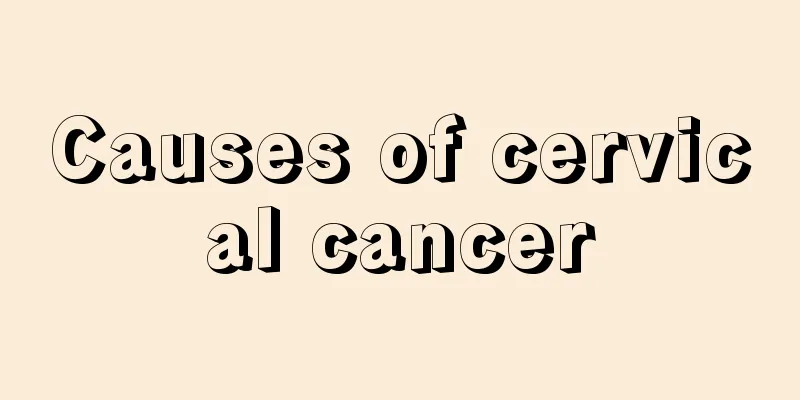Causes of cervical cancer

|
Cervical cancer is a relatively common gynecological malignant tumor nowadays, and in recent years the age of onset has been gradually getting younger. Therefore, many female friends are anxious to get the cervical cancer vaccine. However, cervical cancer is not always caused by human papillomavirus infection. Getting the cervical cancer vaccine can only prevent cervical cancer caused by specific types of virus infection with a high probability. So what are the factors that cause cervical cancer? Factors that cause cervical cancer: 1. Virus infection This factor should indeed be ranked first. Persistent infection with high-risk HPV (types 16 and 18) is a key factor in the development of cervical cancer. According to clinical medical statistics, more than 90% of cervical cancer patients are tested positive for high-risk HPV viruses. 2. Long-term use of contraceptive pills Long-term use of birth control pills increases the risk of cervical cancer. Some studies have found that women who take birth control pills for more than five years have a higher risk of cervical cancer. 3. Unclean daily life This involves the issue of viruses. The more sexual partners you have, the greater your chances of contracting a viral infection. Especially men with genital warts, gonorrhea, genital herpes and other diseases, they may carry the HPV virus in their bodies, and may even be high-risk HPV virus. In addition, many women usually do not pay attention to hygiene in their daily sex life, which may cause the body to be infected by bacteria and cause cervical cancer. Therefore, both parties need to clean up before daily life to avoid infection. 4. The first time you have sex is too early Statistics show that women who have sex before the age of 18 have a ten times higher risk of getting sick than those who have sex after the age of 25. This is because the cervix of adolescent women is more sensitive to carcinogens, and at this time the body's immune system is not yet sound and the resistance is not high, which leads to continuous infection of the HPV virus and causes cervical cancer. 5. Smoking and other bad habits Smoking is one of the factors that increase the chance of HPV infection, which in turn increases the risk of cervical cancer. In addition, malnutrition and poor hygiene can also increase the risk of disease. 6. Multiple miscarriages and abortions Multiple miscarriages can cause cervical disease, and the bacteria produced will increase the probability of cervical inflammation. 7. Women with other STDs Diseases such as gonorrhea, genital mycoplasma infection, and genital warts can invade the cervical squamous epithelial cells and induce inflammation. If not treated in time, it will easily worsen. |
<<: Is stage II cervical cancer advanced?
>>: Cervical cancer development process and time
Recommend
Symptoms of abnormal female sex hormones
As the most common and ordinary organism in the u...
What to do if the cesarean section wound is itchy
Caesarean section usually leaves a wound. It is n...
How to give birth to a boy during ovulation?
In fact, through some cases and studies, it has b...
Shareaholic: Pinterest, Google and Instagram traffic grew significantly in 2017
199IT original compilation According to new data ...
What is the nutritional value of the cabbage that people in the north love to stock up on?
For northerners, "there is nothing better th...
Why is leucorrhea like tofu dregs?
Women's body structure is quite special. Afte...
Can I get pregnant if I have a cyst in my uterus?
Uterine cysts can cause great harm to women. The ...
What is the cause of high prolactin levels?
You must know what pituitary prolactin is. This i...
Can premature ovarian failure be cured at the age of 28?
Premature ovarian failure is very harmful to wome...
How can people with chronic diseases resist the epidemic? Authoritative answers!
Recently, the topic of the weakened pathogenicity...
Sudden pain on the side of one breast
In real life, many women ignore breast pain becau...
Women also think with their lower body
Women, especially Oriental women, always like to ...
What to do if you have mild uterine prolapse
Very few people don’t know that if a woman gets m...
Do menstrual disorders affect fertility?
Menstrual disorders are common endocrine diseases...









